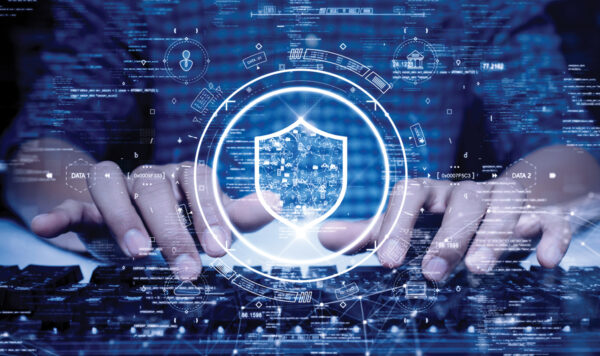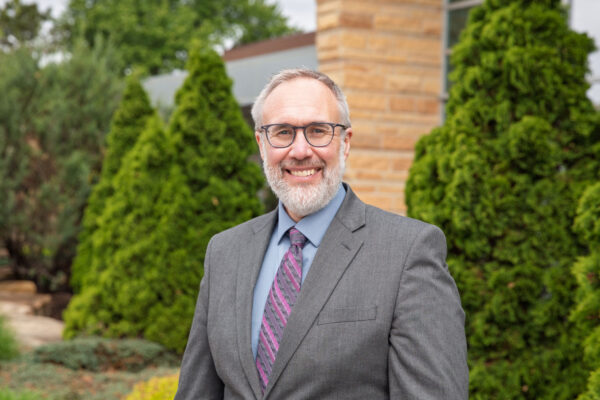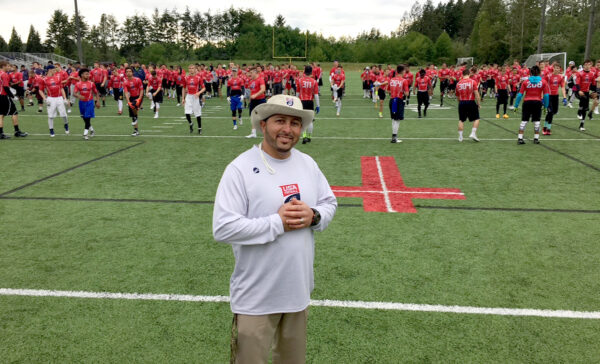As soon as a house or a building is built and ready to be occupied, it needs locks. No sooner are the doors equipped with locks, however, then some people may start making picks to defeat them.
This, says Mike Stiber, is the nature of cybersecurity.
“The only safe computer is one that is unplugged from the net and other networks and is turned off. Given that that’s impractical, cybersecurity becomes one of the frontiers of the computing profession,” said Stiber, professor in the University of Washington Bothell’s School of STEM.
As the need for cybersecurity professionals continues to rise, UW Bothell remains committed to advancing curriculum and professional development in the cyberspace arena. Recently, the University of Washington was re-designated as a National Center of Academic Excellence in Cybersecurity Research and Education by the National Security Agency.
“This designation represents a commitment on the part of both the faculty and the institution that we want to engage the national community of cybersecurity institutions in the conversation about the education and training of cybersecurity professionals,” Stiber said.
Because cybersecurity encompasses a broad array of professions — and the avenues to finding those careers are equally varied — UW Bothell offers multiple degree paths to suit the needs of students at different points in their education and career.
Making a mid-career shift
UW Bothell’s graduate certificate in Software Design and Development program was designed for people with undergraduate degrees in programs outside computer science who want to build the foundation they need to pursue a graduate degree or even jump straight into a career.

“What this does is greatly broaden the pipeline into the profession,” Stiber said, adding that the graduate certificate is also a great opportunity for people looking to make a mid-career shift — students such as Chris Lakin.
When Lakin moved to Seattle in 2014 with a degree in marketing and several years of experience under his belt, he saw it as a chance to rethink his career path.
As he looked into pursuing a master’s degree in cybersecurity UW Bothell, he realized that the certificate program would give him the credentials needed to apply for the master’s program. He completed the certificate in 2015 and then graduated with his Master’s in Cybersecurity Engineering in 2017.
“Security is like an umbrella,” he said. “There are a lot of different avenues that you can go into with security, and the program at UW Bothell gave me a little taste of every single one of the aspects — from networking to application security courses on malware and cryptography. Those fundamentals are still relevant to my job today.”
There are a lot of different avenues that you can go into with security, and the program at UW Bothell gave me a little taste of every single one of the aspects — from networking to application security courses on malware and cryptography. Those fundamentals are still relevant to my job today.
Chris Lakin, Cybersecurity Engineering ’17
Being a self-starter
Lakin now works as a senior technical project manager on the penetration testing program at Dropbox in Kansas City, Missouri, where he grew up. In this role, he collaborates with a team to identify vulnerabilities across the company’s products.
He noted that throughout his career, he’s met many people in the industry who, like him, didn’t have a security background at the beginning of their careers.
“It doesn’t matter if you are just starting off in your career and want to make that shift, or if you’ve been in a career for 55 years already. Anyone can make that shift if they really want to,” he said.
The biggest challenge of his work, Lakin said, is that it’s an ever-evolving, growing field that requires a lot of effort to stay current, but that’s also what he likes most about it.
Indeed, being a motivated self-starter is a must for anyone looking to go into cybersecurity or computer science in general, he noted.
“If you are even remotely considering a career in this industry, just jump in with both feet,” he said. “Try to consume as much knowledge and information as you can, attend conferences, chat with people who are already working in the types of jobs you’re interested in and listen to podcasts — anything you can do to take advantage of the resources available to you.”
Working in the public sector
When Ian Moore first began his life in public and military service by joining the Navy in 1994, he had no idea it would later lead to a career in cybersecurity. His interest in computers was first sparked while stationed in Japan working in intelligence. Born and raised in the Greater Seattle Area, Moore returned home from the Navy in 1998 just in time for the tech boom that would come to shape much of the city’s economy.

He completed an associate degree in General Engineering at Shoreline Community College before transferring to UW Bothell. While working toward his bachelor’s degree in Computer Science & Software Engineering, Moore was also in the Air Force ROTC at the UW’s Seattle campus.
After graduating in 2002, he went into the Air Force with the intention of flying planes. Instead, he wound up working as a communications officer — a role that was a precursor for being a cyberspace officer.
“My classes at UW Bothell were the seed, and that’s where I was first exposed to the defense side, then the Air Force sparked my interest further,” Moore said. “The defense side scratched the itch that I had to be a problem solver and to defend the organizations I worked with.”
Keeping the nation secure
After the Air Force, Moore put his computer skills to work as a developer for Booz Allen Hamilton in Nebraska. He then worked as a network defense analyst for the U.S. Strategic Command in Nebraska, which is the nuclear command and control headquarters for the U.S. and the operation center for the Defense Department’s Global Information Grid.
“I was the first person to be devoted full time to cyberspace planning, and so I was able to influence our command and control plan as it relates to cyberspace and the commands throughout the world,” Moore said.
In 2021, he began working as Washington’s cybersecurity state coordinator for the Cybersecurity and Infrastructure Security Agency. In this role, he supports state, local and tribal organizations — as well as private industry — with their cybersecurity.
Much of Moore’s work at CISA also involves public speaking, whether he is giving presentations to the organizations he works with or speaking at conferences about best practices and the latest cybersecurity recommendations. “I pride myself on my ability to communicate but also to be able to translate ‘geek’ into ‘non-geek,’” he said. “It’s become my superpower.”
Moore noted that while public speaking is not a skill that immediately comes to mind when thinking about jobs in cybersecurity and computer science, it’s become instrumental to his career. For others looking to go into cybersecurity, he recommends they get comfortable with the skill of translating their knowledge in front of large groups.
Raising critical awareness
Apart from working with other government agencies and private industry, Moore also works to raise awareness about cybersecurity among the general public.
While individuals may not need the same level of cybersecurity as a government agency or an organization, Moore says there are still some basic hygiene items that everyone should take to protect themselves:

- Use strong, unique passwords that are not shared across applications.
- Enable multi-factor authentication for online banking, social media or any other site or application that contains sensitive information.
- Think before you click if you receive an email from an unknown or suspicious sender. If the content evokes a sense of fear or urgency, step back and analyze the content and sender because it’s likely a scam.
- Keep your software up to date, both on mobile devices and computer systems.
For more steps and information on how “secure our world” even with your personal devices, he recommends going to the CISA website.
“If everybody does their part, both from the individual level and the organizational and national level, if everyone secures their own assets,” he said, “together we can secure our world.”



